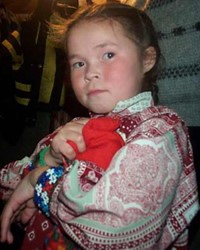Khanty, Ostyak in Russia

Photo Source:
Anonymous
|
Send Joshua Project a map of this people group.
|
| People Name: | Khanty, Ostyak |
| Country: | Russia |
| 10/40 Window: | No |
| Population: | 31,000 |
| World Population: | 31,000 |
| Primary Language: | Khanty |
| Primary Religion: | Ethnic Religions |
| Christian Adherents: | 4.00 % |
| Evangelicals: | 0.90 % |
| Scripture: | Portions |
| Ministry Resources: | Yes |
| Jesus Film: | No |
| Audio Recordings: | No |
| People Cluster: | Finno-Ugric |
| Affinity Bloc: | Eurasian Peoples |
| Progress Level: |
|
Introduction / History
The Khanti of Russia live in western Siberia, just to the east of the Ural Mountains in the area drained by the Ob River. They are known by a variety of other names, including As-iakh, Hante, and Ostyak. Their culture and language are very similar to those of the neighboring Mansi people. The Khanti language is also closely related to Hungarian.
The Khanti once lived to the southwest of their current homeland and belonged to the same ethnic group as the Hungarians. Around A.D. 500, after being forced to leave the region, the Khanti migrated to the northeast and settled near the Ob River. They came under Russian control in the sixteenth century. Russian settlers flooded the region, making the Khanti a tiny minority in their own land. During that time, Russian merchants cheated them, and taxes became unbearable. After the communists took over, taxes were lowered substantially, and education was greatly improved.
Traditionally, most Khanti living in the northerly regions herded reindeer for a living. In the southern areas, they hunted and fished, and in central regions, they practiced a combination of these activities. Many Khanti also were involved in fur trading.
Before 1917, the Khanti lived a semi-nomadic lifestyle, inhabiting one camp in the summer and moving to another for the winter. The preferred dwelling was the yurt, a type of tent.
After the Communist Revolution of 1917, numerous Khanti were moved onto collective settlements where some of them continued to hunt, fish or herd reindeer. Other settlements focused on agriculture or cattle herding; activities foreign to the Khanti. Fur trading was still an important economic activity.
What Are Their Lives Like?
In the southern parts of the Khanti homeland, the land is covered by marshes and forests. Further north, the forests thin into the stark, treeless Arctic tundra. The climate is cold and harsh, and in the tundra regions, temperatures sometimes dip to -60 degrees Fahrenheit.
They now live in small houses in the villages or apartments in towns. Although some Khanti people continue to herd reindeer as their ancestors did, others have reluctantly turned to agriculture or cattle herding. In recent years some Khanti have abandoned their traditional occupations, adopting a more typical Russian lifestyle.
What Are Their Beliefs?
Although most Khanti converted to Russian Orthodox Christianity, they never completely embraced Christianity. They continued to follow their traditional animistic religion (the belief that objects and non-human lives have spirits). This religion has many gods, great and small, with the most important being called Numi-Torem. The Khanti also worship a variety of household deities. Khanti consider the bear sacred and honor it almost like a god. They worship the gods of various parts of nature, including rivers and forests. They also often participate in the worship of dead ancestors.
Traditionally, the Khanti believed that men had five distinct souls and that women had four. Each soul inhabited a different part of the body and could take on different forms, such as those of a bird or other animal. Supposedly, a man could kill himself hunting if he happened to shoot an animal that was one of his souls.
During the days of communist rule, many Khanti became atheists or simply rejected any formal association with any religion. Some continue to believe this way.
What Are Their Needs?
The Khanti have long been forced to adopt Russian culture, and many have been assimilated into Russian society whether they like it or not. With nearly a fourth of all Khanti speaking Russian as their first language, they are in danger of eventually losing their identity as a distinct people group.
At the beginning of the twentieth century, missionary influence caused many Khanti people to turn to Christ. However, today there is little evidence of this work; there are only a handful of known Evangelical believers among the Khanti. The Khanti need laborers and much prayer.
Prayer Points
Pray for the Lord to pave the way for the Khanti people to rise above their current situation and thrive economically and spiritually.
Pray for them to have open hearts to the things of Christ.
Pray for a massive move towards Christ among the Khanti people.